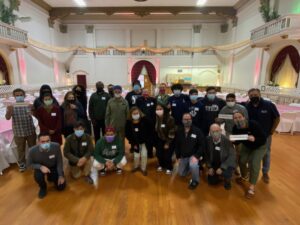Workers, Catholic Labor Network Testify in Support of Right to Recall for Howard County Hotel Workers
At the start of the pandemic, both business and leisure travel ground to a halt, and hotels abruptly laid off most of their staff. As a result, we have seen a nationwide movement for “Right to Recall” or “Right of Return” – state and local policies requiring that hotels, upon reopening, offer employment to their laid-off career employees before seeking replacements. That movement has come to Howard County, Maryland and local Catholic Labor Network members joined local hotel workers in testifying for such a measure before the Howard County Council on Jan. 19.
Catholic social teaching holds that a properly ordered business enterprise is a partnership between management and workers. Right to recall policies help reassemble these partnerships after the disruptions of the pandemic. It seems a matter of simple justice that the career workers who made these firms profitable in the first place have the opportunity to claim their posts as the economy recovers. That’s why last year the Catholic Labor Network supported hotel workers’ union UNITE HERE and other community organizations in successful campaigns for right to recall in Washington DC and Baltimore MD.
Events in nearby Columbia demonstrated why right to recall is important. The owner of the Sheraton Columbia is attempting to use the pandemic to shed a career union workforce and reopen the hotel under a new name with a cheaper, nonunion labor force. Last year the Catholic Labor Network hosted a “listening session” with the displaced workers at nearby St. John the Evangelist parish, where several of the workers attended Mass. The workers asked the community to boycott the hotel until the owner agrees to reinstate them.
Of course, the proposed Howard County law covers all hotels in the county, not just one – it’s intended to level the playing field and make sure that workers in the hospitality industry are made whole after the terrible covid recession. Displaced hotel workers testified how they currently remain underemployed or employed at jobs of much lower quality, and expressed their desire to resume their career positions when available. (The law does not require hotels to hire employees that they don’t need – it just grants “right of first refusal” to the former employees when the hotel IS ready to hire.)
In the hearing held just after Martin Luther King day, Catholic Labor Network member and Howard County resident Ward Morrow summed up CLN’s position admirably:
The Maryland Catholic Labor Network, working with other faith and community leaders, held a listening session to hear directly from these workers. They are our neighbors, our parishioners, fellow taxpayers, and your constituents. They have worked long and hard in Howard County and want nothing more than to get back to their work just as it had been prior to Covid. If a business leader won’t honor that, and at least one has not, then that is why we need to pass this legislation, as other jurisdictions have done. Dr. King got it right when he said,” The labor movement was the principal force that transformed misery and despair into hope and progress.” It is time for the Howard County Council to do the right thing in this case and unanimously pass this legislation.
This newsletter will report on the legislation as it moves forward.

